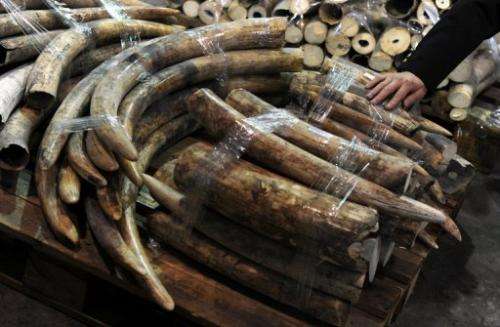Seized ivory tusks are displayed during a Hong Kong Customs press conference on January 4, 2013. Hong Kong customs officers have seized 113 ivory tusks worth nearly $400,000 on the Chinese ivory market, officials said on Wednesday.
Hong Kong customs officers have seized 113 ivory tusks worth nearly $400,000 on the Chinese ivory market, officials said on Wednesday.
The smuggled ivory was seized at the airport on Tuesday in a container marked "spare parts" from Burundi which was bound for Singapore, said an official statement.
The total seizure, weighing 300 kilograms (660 pounds), was worth an estimated HK$3 million ($390,000).
"Upon X-ray image analysis, the consignment was detected to contain ivory tusks instead of spare parts," the statement said.
Customs officers made the city's largest ivory seizure last October when they intercepted almost four tonnes worth about $3.4 million, hidden in shipments from Kenya and Tanzania.
In January, customs officers intercepted another container from Kenya carrying 779 pieces of ivory tusk weighing 1.3 tonnes.
Anyone found guilty of importing ivory into Hong Kong faces up to two years in jail and a maximum HK$5 million fine. Even so, the city remains a major trading centre for processed ivory goods such as carvings and jewellery.
The international trade in elephant ivory, with rare exceptions, has been outlawed since 1989 after elephant populations in Africa dropped rapidly from millions in the mid-20th century to around 600,000 by the end of the 1980s.
However, a rise in the illegal trade in ivory has been fuelled by demand in Asia and the Middle East, where elephant tusks are used in traditional medicines and to make ornaments.
Africa is home to an estimated 472,000 elephants whose survival is threatened by poaching, illegal game hunting and habitat loss.
© 2013 AFP
























